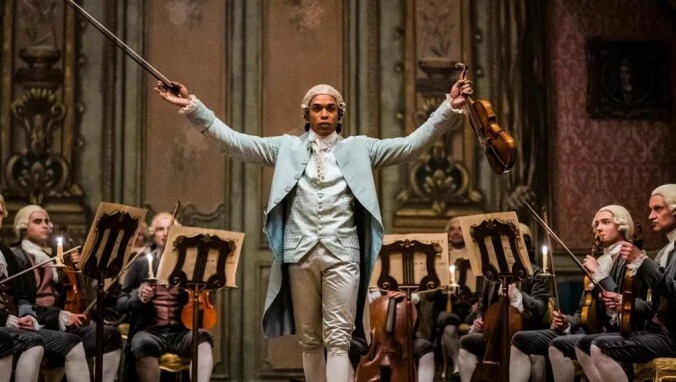Chevalier review: A lost historical figure gets his due in a rousing biopic
Kelvin Harrison Jr. and Samara Weaving excel in this portrait of an 18th-century Black composer navigating racism, romance, and a rivalry with Mozart

Cinema has long been a tool used to re-make history, as a stellar film can reify a historical hero or recover one in the process. Chevalier, directed by Stephen Williams, carries such an impulse as its North Star. Intentionally erased from history books, the figure of Joseph Bologne, Chevalier de Saint-Georges, is here given a biopic designed to enshrine him in our shared cultural imagination—and Williams’ film asks us to confront how the historical record so often depends on such erasure.
Set in 18th century France, a country on the brink of a head-spinning revolution, Chevalier sets the stage for historical revisionism from the get-go. Rather than introduce us to Joseph as a young boy forced to use his every bit of genius to overcome the deeply held racism that surrounds him at school, Williams and screenwriter Stefani Robinson first places the eventual Chevalier on par with Wolfgang Amadeus Mozart. At a concert led by that famed composer, the unknown Joseph dazzles the crowd with a musical duel that immediately has audiences (and Mozart) wondering who this Black virtuoso is and why we have never heard of him before.
Such an opening, blunt as it may establish the film’s raison d’être, anchors Chevalier into a counterfactual history wherein Robinson, Williams, and Harrison Jr. reconstruct a man worth remembering in the same breath as Mozart. It’s only then—following the opening credits—that we learn how a young Black boy conceived in a plantation (a bastard, per his own father’s admission) received his full education in Paris, dazzled the court and Marie Antoinette (Lucy Boynton)—so much so that he earns the title of Chevalier—and how, later still, while composing a comic opera, he found himself embroiled in an illicit affair that eventually radicalized him.
With sumptuous costumes and sets that place us squarely within the decadent world of that famed and ill-fated monarch, Chevalier deals with Bologne’s impossible task of succeeding in such a space. His father tells him early on that he must be excellent—so that his excellence becomes an indefatigable defense against his darkened skin. And true enough, whether dueling with Mozart armed with a violin or fencing in front of the queen, Bologna internalizes this need to have his accomplishments serve as shields and weapons. Much of it serves him well—until it doesn’t.








































